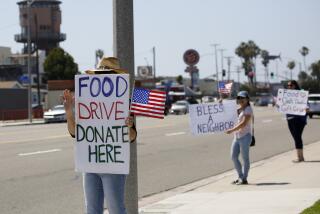Corporate ‘Giving,’ Social Ruin? : ‘Gold Card’ Dimes Only Toy With the Needs of the Poor
On the Friday before Thanksgiving, American Express ran a full-page ad in the New York Times offering cardholders a delightful way of helping the hungry while filling their own stomachs. Every time New Yorkers eat out in a restaurant and charge their meal to the card, American Express will donate a dime to the city’s meals-on-wheels program. Isn’t that nice?
At least when John D. Rockefeller passed out dimes to the poor during the Great Depression, 10 cents was serious money. You could get a doughnut and coffee for a dime. Today you can’t get a pack of gum.
What a splendid symbol of the two-class society we have become, and what a revealing glimpse into the way business comprehends social obligation. If a fancy dinner for two at a midtown restaurant costs $100, American Express is tithing itself at the rate of one-tenth of 1% to help the poor. This, presumably, is the free-market alternative to compulsory social contributions, otherwise known as taxes.
Not very long ago the vast majority of Americans supported the idea that businesses and well-off individuals ought to be taxed so that street people and soup kitchens would not exist. If affordable housing were plentiful, if community care for the mentally ill were adequately funded, if elderly shut-ins were entitled to home visits or to communal meals, there would be no need for this brand of hit-or-miss private noblesse oblige.
But lately organized business has done a very skillful job of convincing public opinion that taxing the well-off to pay for a civilized society is economically counterproductive, if not vaguely un-American. In eight years the top rate on the personal income tax will have dropped from 70% to just 28%.
Under the Reagan Administration, government spending for social programs (not counting Social Security) has been cut by about $40 billion, to its lowest fraction of the gross national product since the 1950s. The cut in tax revenues has created a policy straitjacket in which the only public goal of any consequence is held to be the reduction of the federal deficit.
During the past several months, as America’s social conscience has struggled to come back to life, program after program has been ruled out of order because deficit reduction must take priority. A modest welfare reform proposal, drafted by Sen. Daniel Patrick Moynihan (D-N.Y.) with bipartisan support, aimed at investing in the self-sufficiency of welfare mothers, has been kept off the agenda because of its billion-dollar price tag.
An “affordable housing” bill drafted by Sen. Alan Cranston (D-Calif.), which has the bipartisan support of numerous mayors, proposes to restore federal housing funds to about $15 billion (still only half their 1980 level). But under the Gramm-Rudman deficit-reduction bill, any measure that increases spending requires a special budget waiver and a 60% majority vote. Two weeks ago, Administration loyalists were able to block the consideration of the bill.
A day-care measure is waiting in the wings--as are proposals for more comprehensive health insurance, and restoration of funding for the mentally ill, and a host of other social needs that have gone unmet during the Reagan years. All have been sidetracked by the politics of deficit reduction and the assumption that taxes cannot be raised.
Supposedly, the pure solution to poverty is economic growth and technological advance. Yet society keeps growing richer and the same pathologies keep recurring. The soup in today’s soup kitchens may be heated in microwave ovens, but homelessness persists. This will continue as long as we believe that a better private market is the only social remedy.
American Express has seen the future, and it is a future of more luxury restaurants over here, and more bread lines over there. If corporate America really wanted to do something for America’s needy, it would use its political influence to support a substantial tax increase and a restoration of public spending as well as token increases in private charity.
Will that happen? Sure it will--about the same time that Gold Cards are distributed along the Bowery.
More to Read
Inside the business of entertainment
The Wide Shot brings you news, analysis and insights on everything from streaming wars to production — and what it all means for the future.
You may occasionally receive promotional content from the Los Angeles Times.










